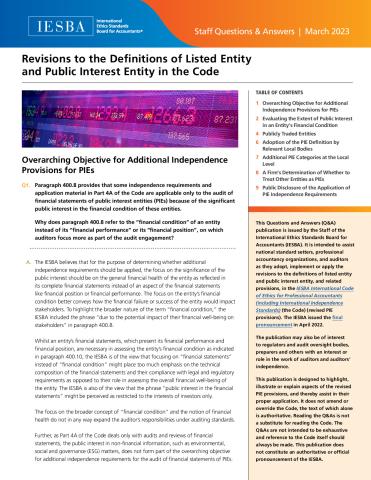Revisions to the Definitions of Listed Entity and Public Interest Entity in the Code
This Q&A publication is designed to highlight, illustrate, or explain aspects of the PIE revisions in the Code and is intended to complement the Basis for Conclusions for the final pronouncement. It will assist national standards setters, professional accountancy organizations, and firms in adopting and/or implementing the PIE revisions. The Q&As will also assist regulators and audit oversight bodies, the corporate governance community, investors, preparers, educational bodies or institutions, and other stakeholders in understanding the revised PIE definition and related provisions in the Code. Among other things, the PIE revisions:
- Include an expanded definition of a PIE by specifying a broader list of PIE categories, including a new category “publicly traded entity” to replace the category “listed entity.”
- Recognize the essential role local bodies responsible for the adoption of the Code play in delineating the specific entities that should be scoped in as PIEs in their jurisdictions, encouraging them to properly define the PIE categories in the expanded definition and adding any other categories relevant to their environments.
- Introduce a transparency requirement for firms to publicly disclose the application of independence requirements for PIEs where they have done so.
The PIE revisions are effective for audits of financial statements for periods beginning on or after December 15, 2024. Read the revisions here.

